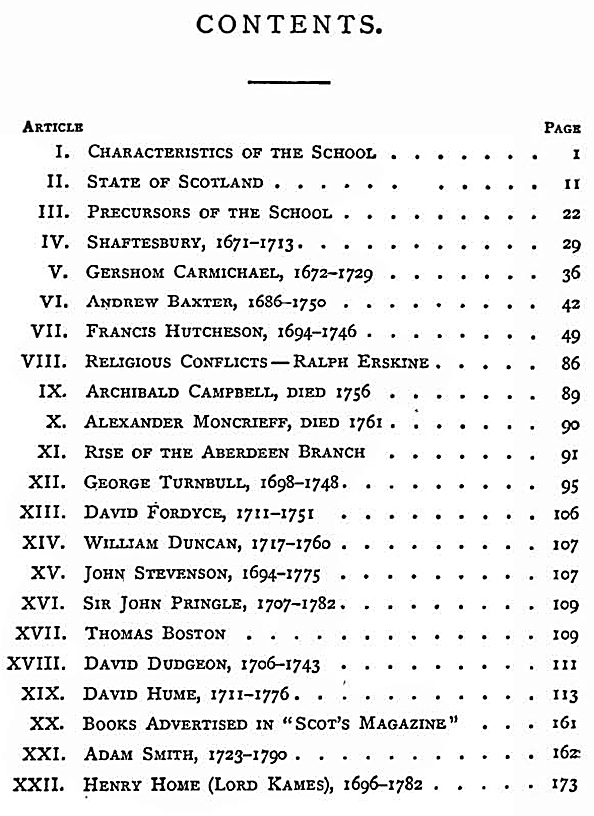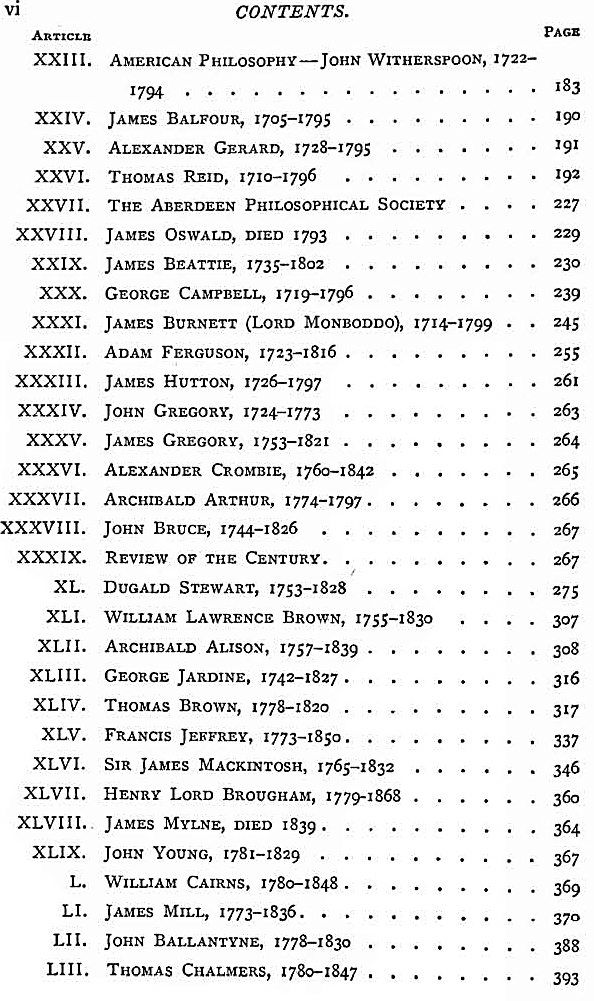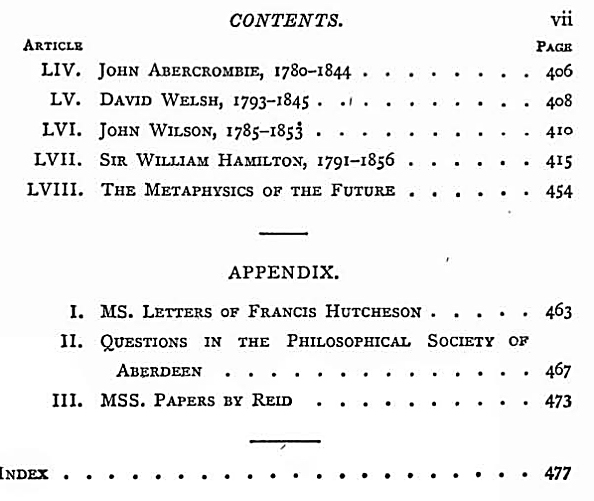|
PREFATORY NOTE
This work has been with me a labor of
love. The gathering of materials for it, and the writing of it, as
carrying me into what I feel to be interesting scenes, have afforded
me great pleasure, which is the only reward I am likely to get. I
publish it, as the last, and to me the only remaining, means of
testifying my regard for my country—loved all the more because I am
now far from it—and my country's philosophy, which has been the
means of stimulating thought in so many of Scotland's sons.
The English-speaking
public, British and American, has of late been listening to divers
forms of philosophy, —to Coleridge, to Kant, to Cousin, to Hegel, to
Comte, to Berkeley,—and is now inclined to a materialistic
psychology. Not finding permanent satisfaction in any of these, it
is surely possible that it may grant a hearing to the sober
philosophy of Scotland.
M. Cousin has
remarked that the philosophy of Scotland is part- of the history of
the country, I have treated it as such ; and I claim to have one
qualification for the work: I am in thorough sympathy with the
characteristic sentiments of my native land. I have farther tried to
make my work a contribution to what may be regarded as a new
department of science, the history of thought, which is quite as
important as the history of wars, of commerce, of literature, or of
civilization.
Some of these
articles have appeared in the "North British Review," the "British
and Foreign Evangelical Review," and the "Dublin University
Magazine;" but the greater number are now given to the public for
the first time, and all of them have been rewritten.
J. McC
Princeton, New Jersey,
October, 1874.



You can download this book
here in pdf format
Another book on this
subject is...
Scottish Philosophy in its
National Development
By Henry Laurie LL.D.
(1902)
PREFACE
This work was
originally intended to form one of a series, projected by Professor
Knight of St. Andrews, on Philosophy in its National Developments.
Though the idea of such a series has been abandoned, little excuse
will, I hope, be required for the appearance of this volume. The
philosophy of Scotland deserves, indeed, to be treated as a national
development. Every philosophy is an expression of the spirit of its
time; and the mental life of Scotland is clearly mirrored in its
intellectual and moral philosophy. The Scotland which gave birth to
men so diverse as John Knox and Robert Burns produced also David
Hume, and Thomas Eeid, and Sir William Hamilton; and its
philosophies of scepticism and common sense, though influenced by
the thought of other countries, have drawn their special sustenance
from the national history and character.
There is room, if I
mistake not, for a concise and connected statement, in the light of
recent thought, of the course of philosophy in Scotland. A
philosophy often discloses its features more distinctly as we are
borne away from it; and its history may require from time to time to
be rewritten. The late Dr. M Cosh's work on The Scottish Philosophy,
published in 1875, is a valuable repository of facts, but as a
critical record it must now appear to be extremely unsatisfactory.
Far more importance attaches to separate studies of the greater
Scottish thinkers which have appeared in intermediate years, and to
references to the philosophy of Scotland to be found in recent
works. While philosophy has entered on new phases, we are now, for
this very reason, able to discern more clearly the leading
characteristics of Scottish philosophy, and to estimate the heritage
which it has bequeathed to younger generations.
No student of
philosophy can afford to neglect the past; but he cannot be expected
to peruse the works of all who were famous in their time, or the
discussions to which they have given rise. And there are many who,
without any pretence to be specialists in philosophy, take an
intelligent interest in the history of thought. To such readers, it
is hoped that this volume will be of service.
UNIVERSITY OF
MELBOURNE, 1901.
CONTENTS.
I. INTRODUCTORY
II. FRANCIS HUTCHESON
III. ANDREW BAXTER
IV. DAVID HUME
V. LORD KAMES
VI. ADAM SMITH
VII. THOMAS REID
VIII. GEORGE CAMPBELL
IX. OSWALD AND BEATTIE
X. LORD MONBODDO
XL ADAM FERGUSON
XII. DUGALD STEWART
XIII. THOMAS BROWN
XIV. THOMAS CHALMERS
XV. SIR WILLIAM HAMILTON
XVI. JAMES FREDERICK FERRIER
XVII. AESTHETIC THEORIES
XVIII. RECENT DEVELOPMENTS
You can download this book
here in pdf format |

